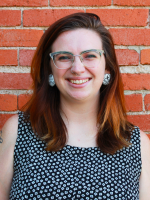Walking into Leslie Coffee Co. in Delano, the first thing you might notice is the aroma of espresso or the various plants around the shop.
But as you look around, there’s a brightly colored fridge sitting in a corner alongside a rack of nonperishable food items.
“Delano’s an area that does have an unhoused community, low-income families who, you know, might be struggling and need assistance,” said Sarah Leslie, owner of Leslie Coffee Co. “I think also Delano is an area that it's kind of … on the border of being a food desert.”

Leslie opened the shop months before the pandemic began. As the shop reopened again for take-out orders, she installed a fridge as part of the ICT Community Fridge Project.
The idea is simple: install a fridge, and the community takes what it needs and leaves what it can.
Leslie saw it as an opportunity to bridge the gap between paying customers and giving back to people who frequent the shop just looking for something to eat or drink.
“If people are hungry, they should be able to find something to eat,” she said.
Jennifer and Kayne are unhoused and utilize the fridge at Leslie. It’s also a place they say they feel accepted.
“We are welcome every single day,” Kayne said. “We can come in here every day, we can sit here until they close – if we want to – and they have no problem with that.”
In return, they help take care of the shop.
“Come in here, you start acting a fool or something, you’re going to ruin this for everybody … that’s coming in here and getting warm,” Jennifer said.
Another unhoused regular is also employed and helps out around the shop. Before then, he helped get food for the community fridge and connected others to it.
He chose to not be interviewed for this story.
“He came in one day in the fall and was like, ‘I think I’m ready to get a job, can I work here?’” Leslie said. “He sees this as like his place.”

The cafe manager of Leslie, Tate Strasner-Martin, is a former social worker who worked with people who were unhoused. He said it just makes sense to help those who need it.
“I think it’s our obligation to the community to offer it,” Strasner-Martin said, “because they’re people just like we are.”
Katie Robu also works at Leslie’s as the head trainer. She said she feels fortunate to work in a space that provides food and safety for others.
“They don't feel like they're being kind of singled out or … viewed differently than any other person,” Robu said, “and it adds some normalcy and some structure to people's lives, which is really important.”
For Leslie, she said this is her way of giving back as a business.
“There are a lot of businesses that do … volunteer work, they do charitable contributions,” Leslie said. “There’s a lot of ways to be charitable and generous as a business. The way we’re doing it here is kind of different because it’s not something that’s separate.”
That outlook hasn’t come without some pushback.
“What people have said to me is… ‘I really appreciate what you're doing. I think it's so great what you're doing, but I have to think about it from the business perspective.’ And I remind them that I'm also running a business,” she said.
Leslie said the community fridge and actually mixing her business and charity together just happened.
“At the end of the day … I’m just trying to do what I think is the right thing,” Leslie said. “It seems like a good opportunity that could help a lot of people.”
For Kayne and Jennifer – it has.
“Boy, if it wasn’t for that,” Kayne said, “Jennifer and I would probably be in some serious trouble.”


